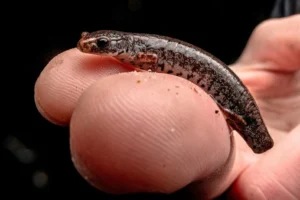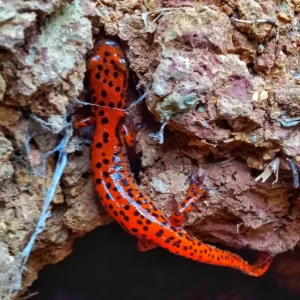Salamanders are small, quiet creatures that live in damp forests, near streams, and in other shady, cool spots. They move slowly, hide well, and don’t usually draw much attention. But because they’re hard to spot and sometimes seem a bit mysterious, many people wonder: are salamanders mean?
Salamanders are not mean. They are shy, gentle animals that avoid conflict and prefer to stay hidden rather than cause trouble.
This means salamanders won’t attack you or other animals on purpose. If they do act defensively, it’s only when they feel scared or threatened. They’re not aggressive by nature.
Salamanders Prefer To Hide, Not Fight
One of the main things to know about salamanders is that they’re naturally shy.
Most salamanders spend their time under rocks, leaves, or logs, or hiding in crevices where they feel safe.
They come out mostly when it’s damp or at night, avoiding bright light and open spaces.

Because they move slowly and rely on being hidden, salamanders don’t want to start fights or chase after things.
Their best defense is to stay out of sight and avoid trouble altogether.
If you ever see a salamander freeze or quickly slip away, that’s just how they protect themselves.
They’re not trying to be mean, they’re just trying to stay safe.
How Salamanders Defend Themselves When Threatened
Even though salamanders don’t want to fight, they do have ways to protect themselves if they have to.
Many salamanders have skin that produces toxins. These toxins can taste bad or even be harmful to predators that try to eat them.
This defense helps salamanders avoid becoming someone else’s meal. The toxins aren’t meant to hurt people or animals unless touched or eaten, but they’re a strong warning sign to other animals.

Besides toxins, some salamanders can also drop their tails if grabbed. This tail keeps moving for a while to distract a predator, letting the salamander escape.
These defense methods don’t mean salamanders are mean or aggressive. They’re just survival tools for when a predator gets too close.
Salamanders Rarely Interact With Humans
Because salamanders like to hide in quiet, damp places, they don’t often run into people. When they do, they usually try to escape quickly.
If you pick up a salamander, it might stay still or try to slip away. It won’t bite or attack.
Some species can secrete a mild toxin through their skin, so it’s best to wash your hands after handling one, but that’s for your safety, not because the salamander is being mean.
In general, salamanders don’t want anything to do with humans and won’t come after you.
Are Some Salamanders More Defensive Than Others?
There are many kinds of salamanders, and their behavior can vary. Some species that live in wetter or more open areas might be a bit quicker to hide or flee.

Others that live in caves or forests might be even shyer. None are known to be aggressive or mean toward humans or other animals.
The way salamanders react depends a lot on their environment and how comfortable they feel. But no salamander species goes looking for fights.
Why People Might Think Salamanders Are Mean
Sometimes, salamanders can startle people. Their sudden movements or appearance might seem strange if you’re not used to them.
Also, because some salamanders look a bit unusual or even slimy, people might assume they’re unfriendly or dangerous. But that’s just a misunderstanding.
Salamanders are actually quite harmless and play important roles in their ecosystems.
Salamanders Are Important And Gentle Members Of Nature
Salamanders help control insect populations by eating bugs, worms, and other small creatures. This keeps their environment balanced.
They are part of the food chain too, feeding bigger animals, but their shy nature and defense mechanisms keep them safe.
Their quiet, gentle presence is a sign of a healthy environment. If you see salamanders around, it usually means the habitat is good and not polluted.
How To Respect Salamanders If You Find One
If you come across a salamander in the wild, the best thing to do is watch quietly and enjoy seeing one up close.
Try not to pick it up unless you really need to, and if you do, handle it gently with clean, wet hands.
Don’t keep salamanders as pets unless you’re experienced, because they have specific needs and are best left in their natural homes.
Giving salamanders space and respecting their shy nature helps keep them safe and happy.
Conclusion
Salamanders are not mean at all. They’re gentle, shy animals that prefer to avoid people and danger. Their slow, quiet behavior helps them stay hidden and safe.
When they do defend themselves, it’s only because they need to survive, not because they want to hurt anyone.
So, next time you spot a salamander, remember it’s a calm little neighbor, not a mean one.
Hi, my name is Ezra Mushala, i have been interested animals all my life. I am the main author and editor here at snakeinformer.com.

